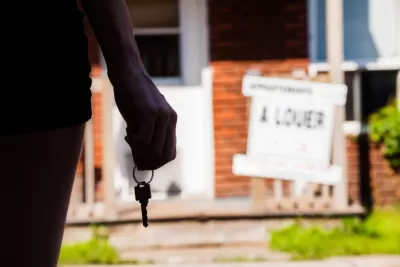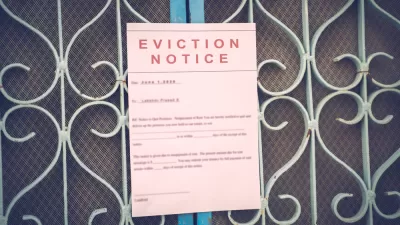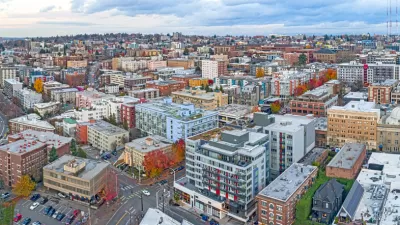Independent landlords struggle to keep up with the cost of rental units and continue to face massive income drops caused by eviction moratoriums. Some of them are pushing back.

Nationwide eviction bans in the name of public safety and economic security during the coronavirus pandemic have kept millions of renters in their homes, protected from displacement. Katy O'Donnell says the bans have produced "an unintended side effect" of threatening the livelihoods of residential landlords.
"The sweeping order effectively requires landlords to subsidize distressed tenants’ housing through the end of the year or face criminal penalties and hefty fines. That’s a tall order for the country’s 8 million independent landlords — most of whom lease a unit here or there on property they own without the financial backing of professional management companies," writes O'Donnell.
Some of the landlords to which O'Donnell refers are the owners of single-family buildings with one to four units, which make up for 22 million units in the United States, according to research by the Urban Institute. With the expiration of the CARES act in late July, and without a new financial relief package in the works, lobbyists are working on behalf of building owners to urge Congress to pass some form of rental assistance.
Housing advocates say that investment in rental aid would help renters and landlords alike. Aid slows ever-growing back rent for tenants and generates some income for landlords who must provide rental subsidies during the pandemic.
"Landlords are also challenging Trump's action in court," O'Donnell reports. "A Virginia landlord filed the first federal challenge to the new order on Tuesday, arguing that the CDC is misinterpreting its authority under a 1944 public health law that gives the agency certain powers to prevent communicable diseases from crossing state lines."
Landlords say that the moratorium put in place by the Centers for Disease Control is the equivalent of a state law rewrite. “If the CDC is right, that that regulation allows them to basically do anything they want to as long as they say it’s for public health, then there’s no limit,” laments attorney Caleb Kruckenberg.
FULL STORY: The flip side of Trump's eviction ban: Landlords face big crunch

Planetizen Federal Action Tracker
A weekly monitor of how Trump’s orders and actions are impacting planners and planning in America.

DARTSpace Platform Streamlines Dallas TOD Application Process
The Dallas transit agency hopes a shorter permitting timeline will boost transit-oriented development around rail stations.

Congressman Proposes Bill to Rename DC Metro “Trump Train”
The Make Autorail Great Again Act would withhold federal funding to the system until the Washington Metropolitan Area Transit Authority (WMATA), rebrands as the Washington Metropolitan Authority for Greater Access (WMAGA).

Supreme Court Ruling in Pipeline Case Guts Federal Environmental Law
The decision limits the scope of a federal law that mandates extensive environmental impact reviews of energy, infrastructure, and transportation projects.

Texas State Bills to Defund Dallas Transit Die
DART would have seen a 30% service cut, $230M annual losses had the bills survived.

Bikeshare for the Win: Team Pedals to London Cricket Match, Beats Rivals Stuck in Traffic
While their opponents sat in gridlock, England's national cricket team hopped Lime bikes, riding to a 3-0 victory.
Urban Design for Planners 1: Software Tools
This six-course series explores essential urban design concepts using open source software and equips planners with the tools they need to participate fully in the urban design process.
Planning for Universal Design
Learn the tools for implementing Universal Design in planning regulations.
Roanoke Valley-Alleghany Regional Commission
City of Mt Shasta
City of Camden Redevelopment Agency
City of Astoria
Transportation Research & Education Center (TREC) at Portland State University
US High Speed Rail Association
City of Camden Redevelopment Agency
Municipality of Princeton (NJ)





























